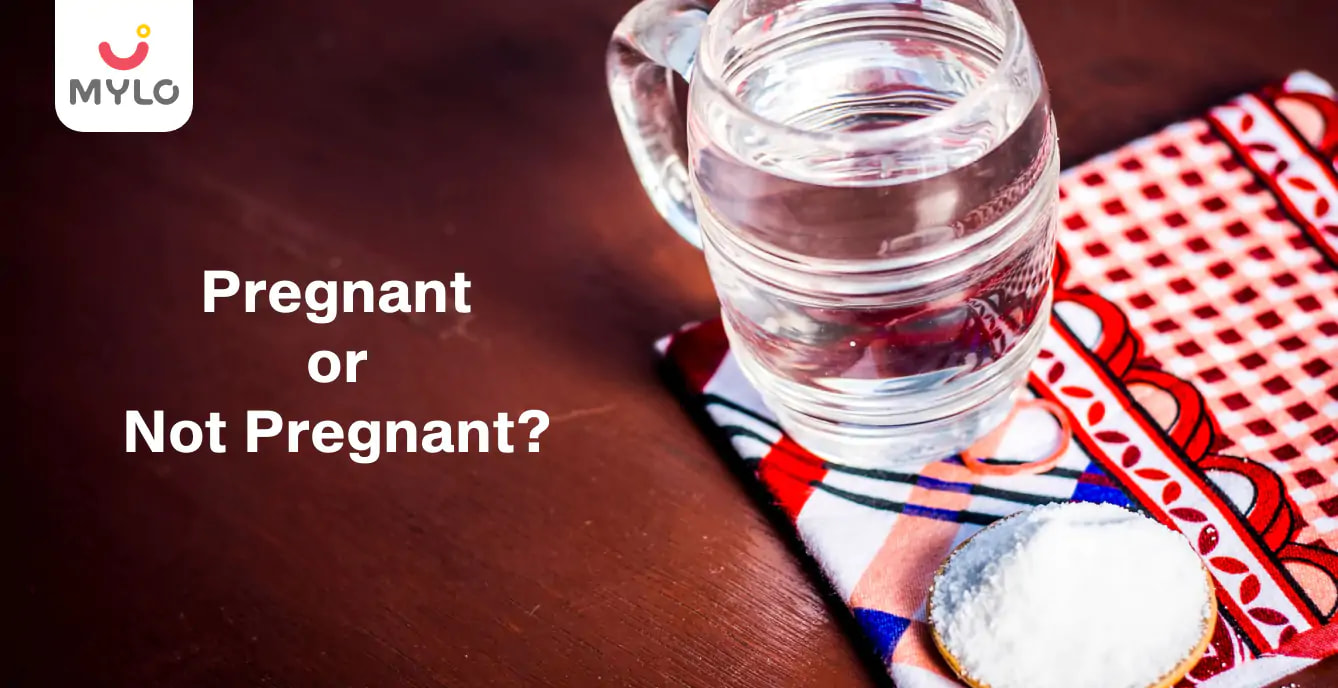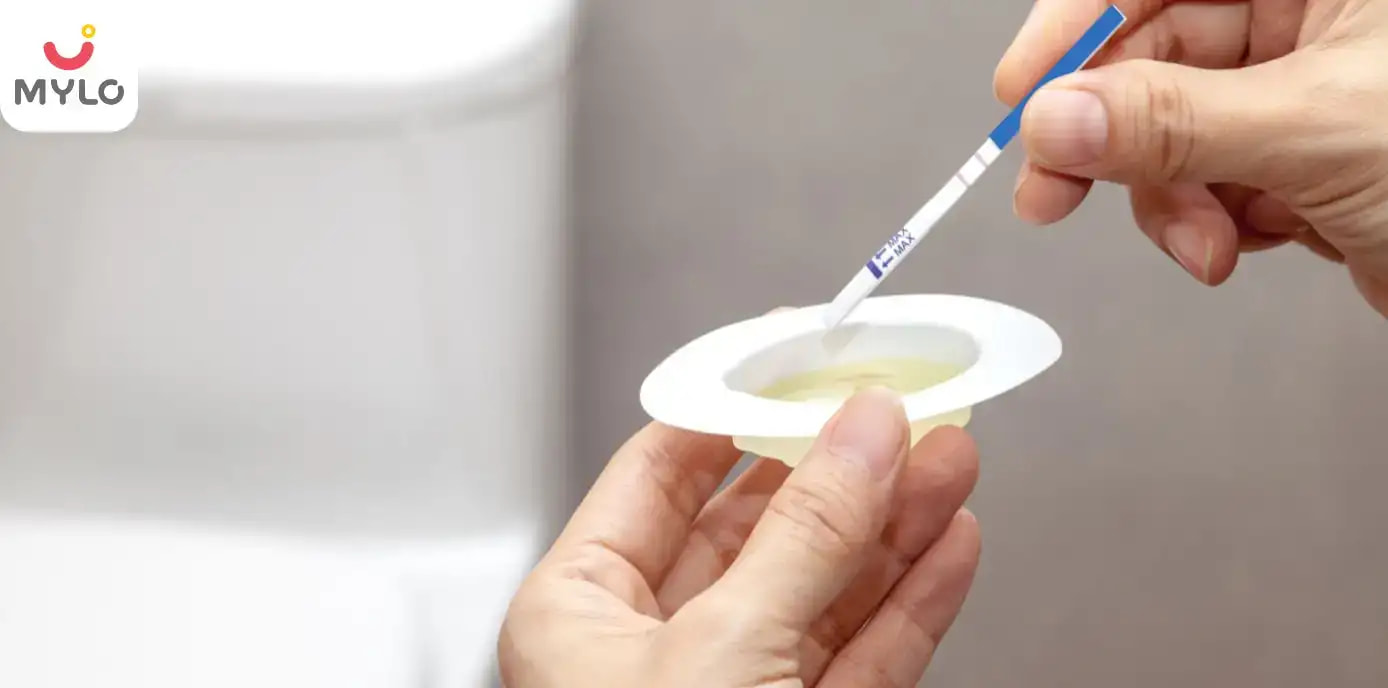Home

Conception

When Is The Right Time To Use The Pregnancy Test Kit?
In this Article

Conception
When Is The Right Time To Use The Pregnancy Test Kit?
Updated on 3 November 2023
There are many people who may find when to use pregnancy test kit a tricky question and situation as well. Sometimes, they want to use it out of excitement and happiness as they really want to be pregnant, while sometimes, it is sheer stress because they don't want to conceive. Now, whether what you wish to see is a positive or a negative result, taking a pregnancy test early can help you quickly answer the question of whether you are pregnant or not. However, there are limitations to a home pregnancy test kit as well. It may sometimes show you that you are not pregnant even though you may be pregnant in reality.
Therefore, if you want to achieve the most accurate results through a pregnancy test kit, you must be thoroughly aware of when to use pregnancy kit. Here we are talking about when strictly should you be testing for pregnancy through a home pregnancy kit.
When Should You Use A Pregnancy Test Kit?
You should wait a week after your last menstrual cycle for the best accurate results to take a pregnancy test.
After having sex, you should wait at least one to two weeks before going to the doctor. It takes time for your body to produce HCG levels that are measurable. After an egg has been successfully implanted, this process typically takes seven to twelve days. If you take the test too early, you may get an erroneous result.
Here are a few signs that show you that you must be taking a pregnancy test now:
1. Missed Period
A missed period is one of the first and most dependable indications of pregnancy. It's difficult to know if you're late if you don't keep a close eye on your cycle. A 28-day menstrual cycle is typical among many women. Think about taking a pregnancy test after more than a month without menstruation.
Remember that stress, food, exercise, and/or medical issues can affect your period's timing. If you think you're pregnant, keep an eye on your period. In the first few weeks of pregnancy, mild bleeding or spotting is usual as the egg moves further into the uterine lining. Keep an eye out for blood color, texture, or volume changes. A positive pregnancy test should prompt you to seek medical attention.
2. Painful Breasts
Pregnancy hormones such as estrogen and progesterone affect your body as you get closer to the due date. Increased blood flow to your breasts can make them feel sensitive and look more prominent. Your nipples may ache, and the veins beneath your skin may appear darker. This symptom isn't usually a sign of pregnancy because many women suffer from breast soreness in the days leading up to their menstruation.
3. Cramps
Menstrual cramps are a possible side effect of implantation. If you're expecting your period to arrive soon in the early stages of pregnancy, but it doesn't, you may be experiencing some pain. Doesn’t this sound familiar? Test yourself. A pregnant woman's hormone levels are different from those of a nonpregnant woman.
3. Feeling Different
Early pregnancy symptoms can include: cramping, painful breasts, and the following:
-
Constipation and diarrhea
-
Sickness
-
Food aversions
These symptoms may worsen over the course of the next few weeks before your HCG levels stabilize towards the end of the first trimester. Pay heed to your body since you know it best. Pregnancy tests may be ordered if you notice any odd physical signs.
You may also like : How Long Does It Take To Get Pregnant? (mylofamily.com)
Failed Contraception
Birth control pills, condoms, and other forms of contraception aren't 100% effective at preventing pregnancy. In other words, no matter how careful you are, pregnancy is always possible. Regardless of your birth control preferences, you may want to take a pregnancy test if you notice any of the following symptoms.
Unplanned pregnancies can also be caused by human error or abnormalities. When it comes to taking birth control, it might be tough to remember to do so. It is estimated that 9 out of every 100 women on the pill will become pregnant if they do not take it as prescribed by Planned Parenthood.
It is possible for condoms to crack or tear, or be applied incorrectly. Planned Parenthood estimates that roughly one in every eight women who use condoms to prevent pregnancy becomes pregnant yearly.
Ask your doctor about other contraceptive options, such as an intrauterine device, if you are concerned about contraceptive failure (IUD). According to research conducted by Planned Parenthood, only one in every 100 women who use an IUD gets pregnant each year.
Conclusion
Thinking of when to take pregnancy test can be overwhelming because you wouldn't know for sure if you've conceived or not. These tips will help you understand when a pregnancy test is needed.
You may also like: How to use a pregnancy test kit (mylofamily.com)
References:
1. NHS. Doing a pregnancy test. www.nhs.uk
2. Robyn Horsager-Boehrer. (2022). How early can home pregnancy tests show positive results?. utswmed.org



Written by
Priyanka Verma
Priyanka is an experienced editor & content writer with great attention to detail. Mother to an 11-year-old, she's a ski
Read MoreGet baby's diet chart, and growth tips

Related Articles
Related Questions
Hello frnds..still no pain...doctor said head fix nhi hua hai..bt vagina me pain hai aur back pain bhi... anyone having same issues??

Kon kon c chije aisi hai jo pregnancy mei gas acidity jalan karti hain... Koi btayega plz bcz mujhe aksar khane ke baad hi samagh aata hai ki is chij se gas acidity jalan ho gyi hai. Please share your knowledge

I am 13 week pregnancy. Anyone having Storione-xt tablet. It better to have morning or night ???

Hlo to be moms....i hv a query...in my 9.5 wk i feel body joint pain like in ankle, knee, wrist, shoulder, toes....pain intensity is high...i cnt sleep....what should i do pls help....cn i cosult my doc.

Influenza and boostrix injection kisiko laga hai kya 8 month pregnancy me and q lagta hai ye plz reply me

RECENTLY PUBLISHED ARTICLES
our most recent articles

Diet & Nutrition
গর্ভাবস্থায় আলুবোখরা: উপকারিতা ও ঝুঁকি | Prunes During Pregnancy: Benefits & Risks in Bengali

Diet & Nutrition
গর্ভাবস্থায় হিং | ঝুঁকি, সুবিধা এবং অন্যান্য চিকিৎসা | Hing During Pregnancy | Risks, Benefits & Other Treatments in Bengali

Women Specific Issues
স্তনের উপর সাদা দাগ: লক্ষণ, কারণ এবং চিকিৎসা | White Spots on Nipple: Causes, Symptoms, and Treatments in Bengali

Diet & Nutrition
গর্ভাবস্থায় পোহা: উপকারিতা, ধরণ এবং রেসিপি | Poha During Pregnancy: Benefits, Types & Recipes in Bengali

Diet & Nutrition
গর্ভাবস্থায় মাছ: উপকারিতা এবং ঝুঁকি | Fish In Pregnancy: Benefits and Risks in Bengali

Diet & Nutrition
গর্ভাবস্থায় রেড ওয়াইন: পার্শ্ব প্রতিক্রিয়া এবং নির্দেশিকা | Red Wine During Pregnancy: Side Effects & Guidelines in Bengali
- ইনার থাই চ্যাফিং: কারণ, উপসর্গ এবং চিকিৎসা | Inner Thigh Chafing: Causes, Symptoms & Treatment in Bengali
- গর্ভাবস্থায় ব্রাউন রাইস: উপকারিতা ও সতর্কতা | Brown Rice During Pregnancy: Benefits & Precautions in Bengali
- Velamentous Cord Insertion - Precautions, Results & Safety
- Unlock the Secret to Flawless Skin: 7 Must-Have Qualities in a Face Serum
- Unlock the Secret to Radiant Skin: How Vitamin C Serum Can Transform Your Complexion
- Gender No Bar: 10 Reasons Why Everyone Needs a Body Lotion
- Unlock the Secret to Radiant Skin How to Choose the Perfect Body Lotion for Your Skin Type
- Top 10 Reasons to Apply a Body Lotion After Every Bath
- Communication in Toddlers: Milestones & Activities
- How to Improve Vocabulary for Toddlers?
- A Comprehensive Guide to Understanding Placenta Accreta
- Vulvovaginitis in Toddlers Causes, Symptoms and Treatment
- A Comprehensive Guide to Understanding Cerebral Palsy in Children
- Bitter Taste in Mouth During Pregnancy: Understanding the Causes and Remedies


AWARDS AND RECOGNITION

Mylo wins Forbes D2C Disruptor award

Mylo wins The Economic Times Promising Brands 2022
AS SEEN IN

- Mylo Care: Effective and science-backed personal care and wellness solutions for a joyful you.
- Mylo Baby: Science-backed, gentle and effective personal care & hygiene range for your little one.
- Mylo Community: Trusted and empathetic community of 10mn+ parents and experts.
Product Categories
baby carrier | baby soap | baby wipes | stretch marks cream | baby cream | baby shampoo | baby massage oil | baby hair oil | stretch marks oil | baby body wash | baby powder | baby lotion | diaper rash cream | newborn diapers | teether | baby kajal | baby diapers | cloth diapers |








